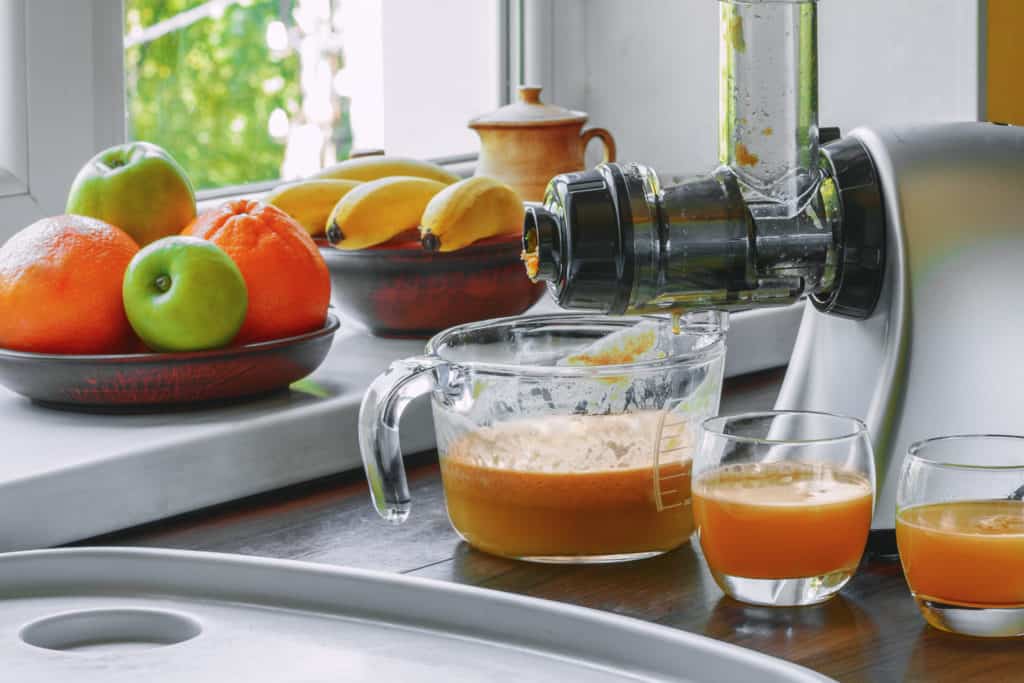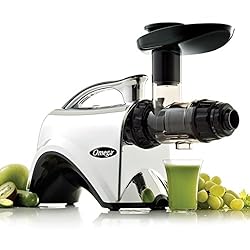
Head back to the Ultimate guide to juicers (The 5 Types Explained)
What is a masticating juicer and how does it work?
Masticating juicers also known as a slow juicers or cold press juicers use a single auger to slowly crush and chew produce into small pieces before squeezing the juice through a screen and extracting the pulp through a separate outlet.
This post will cover horizontal juicers, hop over here to see our post that covers the differences between horizontal and vertical juicers. Spoiler alert, a vertical juicer will save you time!
Masticating juicers extract a high amount of nutrients through this mastication process. The slow turning auger reduces friction and heat buildup which limits the amount of enzyme breakdown, creating a more nutritious juice that can be stored for between 48-72 hours.
Related: Twin Gear Juicers Vs. Masticating Juicers (Read before buying a masticating juicer)
What is mastication?
Mastication (aka chewing) is the process in which food is crushed and ground by teeth, a masticating juicer gets its name due to the crushing and grinding of produce in a similar method.
Assembly and Cleaning Masticating Juicers:
These juicers consist of around 6 parts and therefore are usually quite easy to assemble and clean.
Related: How I clean my masticating juicer (step by step with photos)
Main parts:
- Single Auger that grinds the produce
- Drum that the auger crushes the produce against
- Juicing Screen that the produce is pressed against to extract the juice
- Straining sleeve that strains any pulp from the juice
- End Cap that holds all the above pieces in place
- Other parts include a hopper, plunger, and juice bowl to catch the juice
I can clean my masticating juicer in just a few minutes. I quickly disassemble the pieces above and throw into an over the sink strainer for a quick rinse. It is amazingly simple and time efficient.
Speed:
Speed of the auger spinning will range between around 40 – 120 RPM’s or rotations per minute.
When the speed of a juicer is discussed it is referring to the speed at which the auger turns and not how quickly you will have a glass of juice.
Speed is calculated in RPM’s, or Rotations Per Minute, this number is telling you how many rotations the auger or juicing instrument will turn per minute.
The lower this number the less friction and heat buildup will occur during the juicing process. This is important for nutrient extraction, enzyme retention and plays a role in how long you will be able to store your juice.
What kind of Juice is a Masticating Juicer best for?
These juicers will perform well when juicing hard, dense vegetables such as carrots and beets, but work great when juicing leafy greens and wheatgrass.
Masticating juicers are the most versatile juicer option when it comes to the type of produce they will juice. There are other types of juicers that will produce more juice from dense vegetables, but if you are looking to juice a variety of produce a masticating juicer is the best option.

Do Masticating Juicers Extract More Nutrients than Centrifugal Juicers?
Yes, they do extract more nutrients from juice than a centrifugal juicer. A study on the Influence of Extraction Method on Quality and Functionality of Broccoli Juice (source) compared juice extraction from a masticating juicer, centrifugal juicer, and blender.
The study concluded that the Broccoli Juice from the masticating juicer had the following benefits:
- Highest polyphenol and flavonoid contents, particularly higher DPPH and ABTS radical scavenging activities than those of other samples.
- Additionally, broccoli juice made with the masticating juicer showed the highest growth inhibitory effects against the following cancer cells HeLa, A549, AGS, and HT-29
- Broccoli Juice made with the masticating juicer had the highest a-glucosidase inhibitory effects. A-glucosidase inhibitors can block the breakdown of some starches and slow down the absorption of some sugars, leading to better blood sugar levels.
Related: Masticating Juicers Vs. Centrifugal Juicers (What makes them so different?)
Do Masticating Juicers Yield More Juice than Centrifugal or Twin Gear Juicers?
When compared to a centrifugal juicer they produce higher juice yields for most fruits and veggies when. At times it can visually appear that a centrifugal juicer has produced more yield, however, you will notice that the juice from the centrifugal juicer is lighter in color and has much more foam. This is due to oxidation created by a centrifugal juicer, meaning that air has been introduced into the juice, this makes the juice degrade faster.
Twin gear juicers produce more yield than masticating juicers, some studies I have seen show about 20% more yield when juicing carrots. While twin gear juicers do produce more juice yield, the juicing process can take up to twice as long as it does with a masticating juicer.
How Quickly Does a Masticating Juicer Extract Juice?
It will take approximately 2.5 minutes to juice enough carrots to get 12-16 ounces of juice.
When you add in assembly and clean up time the total all in time is around 10 minutes, 2.5 minutes to set up, 2.5 minutes to juice, and 5 minutes to clean up.
For this reason, I like to juice a couple days of juice at one time, this keeps the set up time and clean up time the same and only increases the juicing time, you can increase your time efficiency quite a bit by doing this.
These juicers will produce a cup of juice faster than a twin gear juicer, but slower than a centrifugal juicer.
Do Masticating Juicers Remove Fiber?
Yes, they do remove the fiber in the juice. This is done by first pressing the juice through a juicing screen and then straining the juice through a second screen as it is emptied from the juicer.
The theory behind the removal of the fiber is that the body can absorb the nutrients from the juice more quickly and easily without needing to digest the fiber.
How Reliable are Masticating Juicers?
They are some of the most reliable juicers available; Omega provides 10 to 15-year warranties on their masticating juicers. I have been using an Omega J8006 regularly for more than 5 years without any issues.
The reliability will of course come down to the quality of the brand you are purchasing.
How Loud is a Masticating Juicer?
They are not loud, they break off chunks of produce and grind them with a slowly turning auger. This will make some noise but will not wake the house.
How Long can you store juice from a Masticating Juicer?
Juice can be stored from 48-72 hours depending on which juicer you are using.
This is much longer than juice from a centrifugal juicer and in line with juice from a twin gear juicer.
Masticating Juicer Pros and Cons:
Should I purchase a Masticating Juicer?
You should if you are in the market for an efficient juicer that will last you for years to come. These are my favorite types of juicers and the type I use daily.
I prefer masticating juicers due to how well the perform with any type of produce, the speed at which I can make a glass of juice, the length that I can store a glass of juice, the limited oxidation, and high nutrient extraction.
Combine the above points with the fact that you can get a very good quality masticating juicer with a 15 year warranty for a decent price, I say purchase your masticating juicer now, you will not regret it.
Conclusion:
During my research of what a masticating juicer is and how they work, I determined that masticating juicers offer an affordable, quick, and easy method to juice daily. Also, due to the slow mastication process, they extract high levels of nutrients and juice yield.
Masticating juicers are a great choice if you are just starting out, if you are an expert, or if you want a versatile kitchen staple to justify your investment.
If you are not sure a masticating juicer is the right type of juicer for you, hop over to our in-depth guide that explains each type of juicer, here you will learn enough about each type of juicer to make an informed decision.
Related: Why Masticating Juicers are Better than Centrifugal
Until next time, Happy Juicing!

Leave a Reply